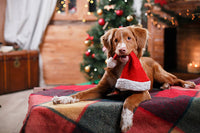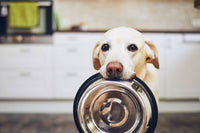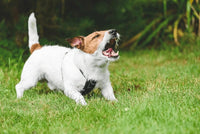Subtotal
CAD $0.00
or
Embarking on a journey with your pet eerily mirrors traveling with a toddler. Just as we pack snacks, activities, and comforting blankets for our children, it's important that we extend the same care to our furry companions. So, let's shift the narrative and ensure our pets receive the comfort and attention they deserve while traveling. Whether on the road or in the air, in this article we discuss the tips and tricks for successfully traveling with your pet. Let’s go!

Purchase the proper carrier. Soft carriers work well for smaller pets while hard case carriers are more suitable for larger pets. Make sure your furry friend can stand up and turn around comfortably in the carrier you choose.
Practice with your pet. Help them get comfortable in their carrier by having their carrier in your living space. This helps your pet become familiar with it, and helps make it less scary. You can also practice loading and unloading the carrier, allowing you to build both your confidence and trust in the process.
Do your research. Make a list of local veterinarians in the area in which you are traveling. Not all vets are created equal. Look up your options and hope you won’t have to call, but if you do, you’ll have your “go to list.”
Prepare for the road. If your pet rides in the back of the car or truck, consider a harness. Dogs riding in the front or on the laps of their owners can be distracting and dangerous, not only for you and your passengers, but for other drivers as well. The road is a dangerous place so let’s work together to keep our eyes and attention on the road. Don’t forget to grab your leashes, harnesses, poop bags, bedding, treats, and a couple of rags. Pets get motion sickness too. To try and avoid motion sickness, give your dog Dramamine 30 minutes before getting on the road.
Set your pet up for success. Engaging your pet in physical activity before travel can help them relax for the journey ahead. Packing snacks, familiar toys, and bedding provides comfort and familiarity, while monitoring food and water consumption prevents accidents. Opting for evening travel and incorporating potty pads into carriers can also contribute to a quieter and smoother journey.
Familiarize yourself with airline and hotel pet travel policies, as each carrier and hotel has their own unique regulations. Ensure your pet's vaccinations are up to date and obtain necessary health paperwork from your vet. Stay informed by contacting airlines and the hotel directly for the latest policy updates, as regulations may change.

Below are summaries of pet travel policies from popular airlines to aid in your journey planning.
Delta suggests a soft carrier with dimensions of 18” X 11” X11” or smaller. This size allows the carrier to be stored under the seat in front of you and is a standard size that fits most airplanes.
Traveling with pets in-cabin is only allowed for cats and dogs when there’s space available. Each traveler can bring up to two pets. If you’re traveling with two pets, you must purchase two seats on your flight. Your second seat needs to be next to your assigned seat so you can care for both pets. Here’s what you need to know, regardless of which type of furry friend you have. United has a $125 per pet travel cost for each way on your trip. If you have several legs and any of them are 4 hours or longer there is an additional $125 per pet on each of these layovers.
American Airline flights allow 1 kennel as a carry on bag. They require you to pay the carry-on pet fee, the kennel must fit under the seat in front of you and the pet must remain in the kennel while on the plane. Please know that with this airline your carry on IS the kennel and then you are allowed a small personal item like a purse or laptop case. If your pet is too large to fit under the seat in front of you, the airline will have space in the cargo area.
American Airlines only allows checked pets if they are Active-Duty U.S. Military and U.S. State Dept. Foreign Service personnel flying on official orders. Be aware that American Airlines requires you to contact reservations 48 hours prior to your flight. Bring your official orders to the ticket counter, pet health certificate, complete the required checklist with an agent, and allow for extra time to check in. It is suggested to allow yourself 2 hours, but no more than 4 hours prior to your flight.
Alaska Airlines provides “Fur-st Class Care™ for our furry friends—because they understand that they’re not just a pet, they’re family. Their pet travel program offers options for transporting your pet safely with top-notch care as their priority. Small pets that fit under the seat can ride in the cabin. Larger pets have a temperature-controlled baggage area. This might not be suitable for your pet so make sure to investigate the airline’s pet size and carrier size to learn about your options.

Engaging your pet in physical activity before travel can help them relax for the journey ahead. Packing snacks, familiar toys, and bedding provides comfort and familiarity, while monitoring food and water consumption prevents accidents. Opting for evening travel and incorporating potty pads into carriers can also contribute to a quieter and smoother journey.
In conclusion, traveling with pets in the air, or on the road can be stressful for both you and your furry companions. By implementing these tips, you can ensure a more enjoyable travel experience for both you and your pet. Travel Smart, Travel Safe.

Announcing the Winners of Our 2025 Pawsome Costume Contest!

The holidays are right around the corner — a time filled with friends, family, and festive chaos. But if your dog barks nonstop at visitors, delivery drivers, or even the sound of wrapping paper, it can quickly turn your joyful season into a noisy one.

How to Keep Racoons, Skunks, and Squirrels Away - Without Traps or Poison

Why Dogs Shouldn't Eat Turkey: What Every Pet Owner Should Know

You love your dog—but the constant barking every time someone walks past the fence? Not so much.